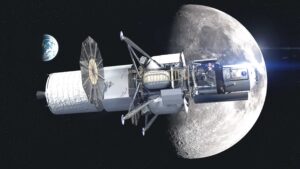“We stand ready to help NASA moderate its technical risks and solve its budgetary constraints and put the Artemis Program back on a more competitive, credible, and sustainable path,” Bezos wrote in the letter.
In his proposal, Bezos said that Blue Origin will waive any payments both in the current fiscal year as well as the next two, up to $2 billion. “This offer is not a deferral, but is an outright and permanent waiver of those payments,” he wrote. “This offer provides time for government appropriation actions to catch up.”
Blue Origin would also carry out at its own expense “a pathfinder mission to low-Earth orbit of the lunar descent element to further retire development and schedule risks.” That would be in addition to an uncrewed lunar landing demonstration that the company says was part of its “baseline plan” for developing the lunar lander system.
Bezos added that Blue Origin would accept a firm-fixed-price contract for the work, something that NASA had already required for HLS.
The letter is the latest bid to get NASA to award a second HLS contract, something the agency had originally planned. However, in April it announced it was making a single HLS award to SpaceX because of budget constraints. SpaceX offered the lowest bid at $2.9 billion, compared to $5.99 billion by the Blue Origin-led “National Team” and $8.5–9 billion by Dynetics, the third bidder.
Blue Origin officials complained that, unlike SpaceX, they were not given a change to revise their price during the HLS competition, an argument Bezos reiterated in his letter. “That was a mistake, it was unusual, and it was a missed opportunity,” he said. “NASA veered from its original dual-source acquisition strategy due to perceived near-term budgetary issues, and this offer removes that obstacle.”
NASA officials said in April they did not negotiate because of the limited funding it had available. “I do not have enough funding available to even attempt to negotiate a price from Blue Origin that could potentially enable a contract award,” Kathy Lueders, NASA associate administrator for human exploration and operations, wrote in the source selection statement outlining her rationale for selecting only SpaceX.
Both Blue Origin and Dynetics filed protests with the Government Accountability Office regarding the HLS awards. The GAO has an Aug. 4 deadline to rule on the protests.
Agency officials have declined to discuss details about its HLS plans, citing a “blackout” imposed by the protest. “The contract to SpaceX is held in abeyance right now as it is contested,” Nelson said in a July 21 webinar by The Washington Post. “We’re expecting an announcement in the next few weeks and, on the basis of that, we will then proceed.”
Nelson has lobbied Congress for additional funding to be able to support a second HLS provider regardless of the outcome of the GAO protests. “We need some more money to enhance and procure that competition so that there are other players that get involved,” he said in the webinar.
He previously told congressional appropriators that NASA would need $5.4 billion in additional funding to support a second HLS provider, suggesting that money could be included in a separate jobs and infrastructure funding package. However, there’s been no sign that such funding would be included, and a House version of a fiscal year 2022 spending bill provided $1.345 billion for HLS, just $150 million above the agency’s request.



